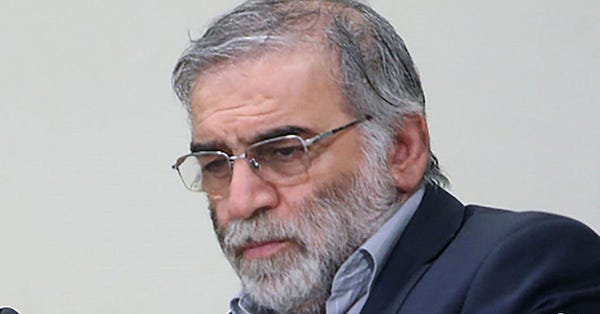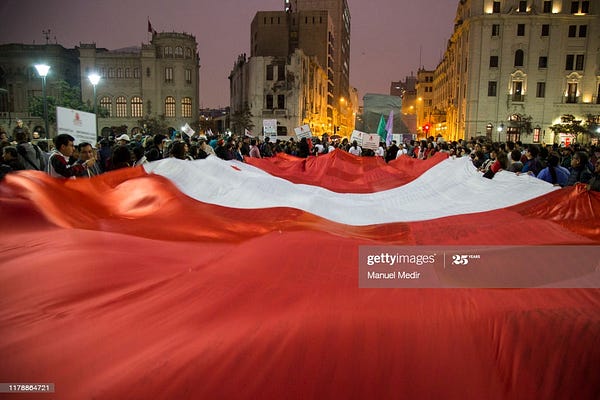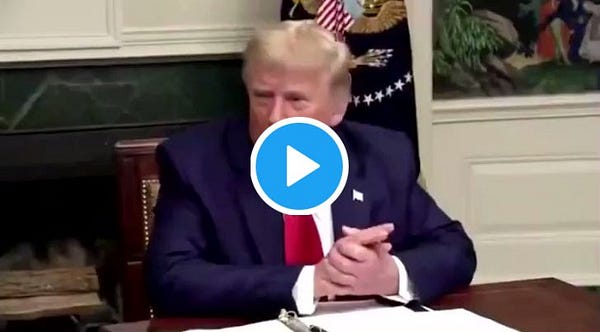The Most Interesting People in the World: What Biden's Cabinet Says About his Presidency.
The first batch of Biden's cabinet choices is full of clues about the future. Also in this edition: Iran, Israel and Saudi Arabia Tension; Belarus Dictator Wobbles; A Rare Victory for Peru's Democracy
Highlights This Week — Scroll Down for:
Biden’s Uncommon Cabinet: A Glimpse into His Presidency
Iran Intrigue: An Assassination in Tehran, a Secret Meeting in the Saudi Desert.
Belarus Shocker: Is the Tyrant Wobbling?
Peru Democracy: A Partial Victory for the People
The Most Interesting People in the World: Glimpsing the Future in Biden’s Early Cabinet Picks
We can learn much about a presidency by observing key personnel choices, the individuals the president-elect selects to help him execute his vision. That applies even more to Joe Biden, because he has spent nearly half a century in government, so he knows all the players deeply. His predecessors, Donald Trump and Obama, had far less experience, so they had to rely much more on the advice of others. These are his choices.
With his first constellation of cabinet-level nominees, Biden unveiled an intriguing group. That this national security lineup is made up of highly experienced and thoroughly qualified individuals is without dispute. But there’s something else that caught my attention about the fledgling team.
This may just be the most interesting group of people ever assembled for bureaucratic posts. Before I tell you more about their riveting back stories, let me point out why that matters for the country.
A wide range of backgrounds, with smart, experienced and qualified people, offers some protection against groupthink, against shared blind spots. The variety of life experiences builds some guardrails, preventing the US security and foreign policy decision-making from becoming an echo chamber of preconceptions and misconceptions. It also allows for more creative ideas. There’s little out-of-the-box thinking when everyone has lived in the same box.
The new team will make mistakes, but this offers a measure of protection.
Consider Avril Haines, Biden’s choice for Director of National Intelligence, the person who oversees the country’s massive intelligence operations.


Haines, a former deputy director of the CIA and deputy national security advisor, is routinely described as brilliant. But what’s truly distinctive is her life story.
Forget the traditional resume for a successful government career.
After finishing high school, she moved to Japan for a year of intense Judo training. She returned to the U.S. to study theoretical physics, helping to support herself with a job as a car engine mechanic, while also learning to fly. (She’s still a pilot, who tried to cross the Atlantic in a small plane, a venture that nearly ended in disaster.)
She was working on her PhD in physics when she and her husband decided to buy a bar that had been seized in a drug raid, turning it into a bookstore and art gallery.
Eventually, she became a lawyer, working in the Hague, the Department of State, and the Senate Foreign Relations Committee, chaired by Sen. Joe Biden. That led to national security jobs, and fast climb.
Much is made of the fact that she’d be the first woman DNI, but she’s the first of many things. On the day Biden announced her nomination, she promised to “speak truth to power,” vowing that she would let the president know when she disagreed with him; a sharp contrast to the outgoing president, who demands incessant praise and loyalty to him above everything else.
Biden’s choice to head the Department of Homeland Security is Alejandro Mayorkas, a Cuban-born Jew (half Ashkenazi, half Sephardic) who came to the United States as a refugee following the Communist takeover of the island. Mayorkas, who will be responsible for border protection, immigration, and other migrant and refugee related matters, brings not only professional qualifications, but life experience that tell him what it means to flee dictatorship and brutality. His mother’s family also fled persecution, arriving in Cuba to escape the Holocaust.
Then there’s Antony Blinken. His father was a U.S. ambassador to Hungary, probably giving him an early glimpse into diplomacy, but it was his stepfather who had the greatest impact.
Blinken grew up in Paris, with his mother and her husband, Samuel Pisar, a Holocaust survivor. Of 900 children in Pisar’s school in Bialystok, only he survived, enduring the Nazis most notorious death camps, Dachau and Auschwitz.
Watch Blinken tell the story of how his father ran into an American soldier after escaping his captors, and how that helped shape his view of America’s role in the world.


Biden’s choices all come to office with life-shaping history that helps guide who they are and what they believe. And we know those ideals and views reflect Biden’s, because he knows these people well and chose them.
They also point to a salient feature of the incoming administration. They are all internationalists, multilateralists. Blinken, who advised Obama to do more in Syria, believes the U.S. should become engaged and work with allies.
Here’s Blinken, explaining diplomacy to Grover on Sesame Street. Watch it.
Another fierce champion of US involvement and diplomacy is Linda Thomas-Greenfield (LTG), the nominee for United Nations ambassador was pushed out by the Trump administration after a stellar 34-year career in the foreign service. The odds of an African-American woman climbing through the ranks to the highest levels of the ultra-establishment State Department reveals her diplomatic, and intellectual skills.
Biden has so far been able to thread the needle. He’s navigating between the left leaning progressives in the Democratic Party, and the Republicans in the Senate, whose support he wants to enlist. Opposition from progressive is reportedly stalling the nomination of Michèle Flournoy for Defense secretary
A superb needle-threading example is Janet Yellen, who will be nominated as Treasury secretary, also a first for a woman. Wall Street and Main Street cheered at news that the former Federal Reserve Chair will take the critical job in the midst of the economic crisis. Choosing a Treasury chief that pleases financial markets and party activists is an extraordinary feat.
The nominee’s fascinating range of personal experiences does not mean they are free from controversy. The time outside government for several of the key players suggests a disturbing pattern of profiting from their contacts, potentially posing grave ethical questions. Even so, the ethical issues pale in comparison to the avalanche of criminality in the Trump administration.
The Biden team faces enormous challenges, a raging pandemic, an economic crisis — one in six Americans faces hunger — and a divided, hard to govern country.
Is it too soon to become optimistic about America again? I pondered that difficult question in this CNN article, concluding:
“American democracy just survived what is arguably the most vicious attack it has ever faced. The American system held up. The American people, voters, patriotic public servants, made it happen. What could be a greater cause for optimism about the future?”
Enormous problems lie ahead, with Trump standing in Biden’s way, still rejecting the election results in bizarre fashion.
But something has changed. A new era will soon begin.
Iran Intrigue: An Assassination in Tehran; a Secret Meeting in the Saudi Desert.
Tensions and intrigue are intensifying around Iran, and the timing is not coincidental. Trump’s presidency has barely 50 days left.
On Friday, the Iranian regime revealed that the head of its nuclear program, Mohsen Fakhrizadeh-Mahabada, had just been assassinated, shot in his car in the outskirts of Tehran. Fakhrizadeh, described by Iran as an academic and a scientist, was much more than that. Western intelligence officials believe he led the nuclear program that secretly sought to develop nuclear weapons. He was also a former brigadier general in the Iranian Revolutionary Guard Corps


Iran blamed Israel and the United States for the hit, and no one took responsibility. But many intriguing events occurred before the killing.
A few days before, Israeli Prime Minister Benjamin Netanyahu had held a semi-secret meeting with Saudi Arabian Crown Prince Mohammed bin Salman. The Saudis denied it, but flight tracking and detailed reporting by Israeli journalists suggest it did occur. U.S. Secretary of State Mike Pompeo was also in the region. The three countries – Israel, Saudi Arabia, and the United States – view Iran’s regime and its nuclear program as a grave threat.
A couple of weeks earlier, we learned that Israeli agents killed Al Qaeda’s second highest ranking leader in Iran during the summer. The U.S. says Abdullah Ahmed Abdullah was the mastermind of the 1998 attacks on American embassies in Africa that killed 224 people. The assassination came on the anniversary of the attack.
Perhaps these events are unrelated. But I found it particularly interesting that AlQaeda’s Number 2 was in Iran.
Was there an evolving link between Iran and Al Qaeda? Al Qaeda is eager to regain its post-9/11 prominence. A link between Iran’s nuclear program and a terrorist group is the stuff of nightmares.
Why was Fakhrizadeh killed?
The most likely explanation is that Israel, Saudi Arabia, and the outgoing Trump team are building a barricade in advance of the Biden administration, trying to get as much done to neutralize the Iranian threat before the Biden administration reengages with Iran, and trying to make it more difficult for Biden to reenter the nuclear deal they found dangerously weak. The Iranians are furious and unlikely to trust the U.S. after this. The attack makes it much more difficult for the nuclear deal to restart.
The question now is how Iran will respond. They have promised to retaliate - and some fear war. But that seems unlikely. Nobody wants a war right now.
As we watch for Iran’s threatened response, it’s worth keeping in mind that there is much we don’t know about what is happening behind the scenes in any of the countries involved - and even in some that appear to be on the sidelines.
Belarus Shocker
In earlier issues we talked about the popular uprising in Belarus against long-time dictator Alexander Lukashenko? You’ll remember, a pro-democracy movement led by three women burst onto the streets of Minsk this summer after Lukashenko stole yet another election.
Protests have continued despite Lukashenko’s repression and refusal to recognize the results.
Then suddenly, on Friday, Belarus media reported that Lukashenko said he will step down after a new constitution is in place.


Lukashenko is a wily operator; he has survived in power for 26 years. It could all be a trick to persuade the opposition to relent. But it may not. The protests are exhausting. Even Putin may have had enough.
This is the first glimpse of a possible end to Europe’s oldest dictatorship.
Peru Victory for Protesters and Democracy


Speaking of victories by the people, you’ll remember two issues ago we spoke about how the Peruvian Congress, widely reviled by the population, managed to topple President Martin Vizcarra.
Vizcarra had staked his presidency on uprooting corruption and reforming the judiciary. Members of Congress, beneficiaries of the system Vizcarra sought to transform, would have none of it. Using a highly controversial maneuver – a constitutional coup, critics called it - they removed him from office.
Manuel Merino, head of Congress and key player in Vizcarra’s ouster, was sworn in as president. But his presidency ended quickly.
Infuriated Peruvians took to the streets. Polls showed more than 90 percent rejected the decision. Despite the devastating pandemic – worse in Peru than almost anywhere on Earth – massive crowds demonstrated and, after protesters were killed by police, Merino’s cabinet members backed away from him and so did the military.
Merino resigned less than a week after being sworn in. Next in line was Francisco Sagasti, who had succeeded Merino in Congress. He became the third president in one week.
It was a remarkable victory for protesters seeking to defend the remnants of their besieged democracy.
The well-liked Sagasti, if he survives, will stay as president through next April’s election and until the winner takes office in July.
More on Peru’s drama from Simeon Tegel for World Politics Review.
That’s it for this week.
Thank you for all the kind words about INSIGHT, and for inviting your friends to join. The number of people signing up is growing fast.
At some point in the future, I will open the site to comments and debate. More on that later. (Does it appeal to you?)
Welcome to all the new members. Let me know what you think.
I welcome comments, praise and criticism at FridaInsight@gmail.com
Until next time-
Stay healthy; stay informed; stay engaged.
Frida








